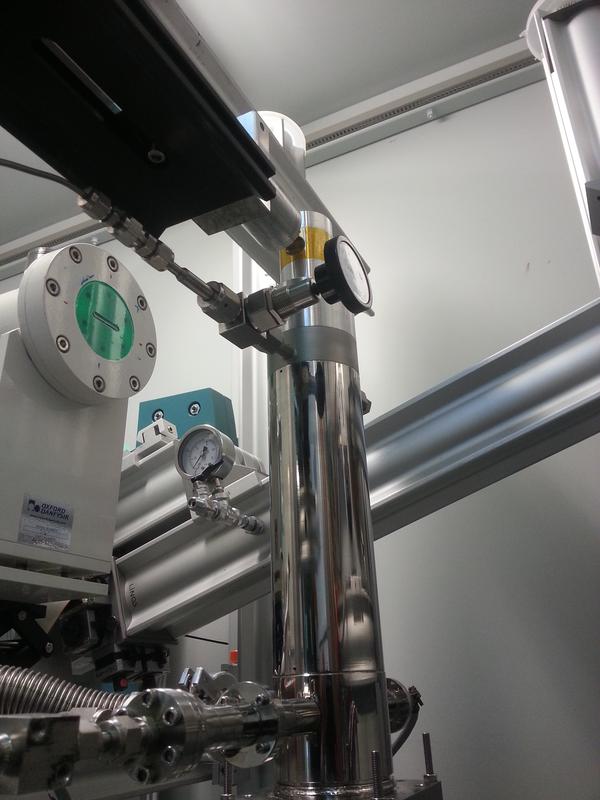Scientists at TU Dresden discover new phenomenon in the field of gas-solid interactions

In situ measurement setup for structural analysis at a synchrotron (Helmholtz Centre Berlin) TU Dresden, Prof. AC1
Adsorption refers to the process by which molecules of a gas collect on the surface of a solid. Metal-organic frameworks are highly porous materials which are widely used for adsorptive applications such as in the reduction of pollutant emissions.
The scientists from Dresden, Berlin and France have now succeeded in demonstrating that these materials can dynamically change their structures.
During this change of structure, the scientists observed a so far unknown phenomenon: instead of absorbing the gas under pressure increase, the materials released the gas eruptively after reaching a certain threshold.
This new phenomenon in the area of gas-solid interactions is therefore called Negative Gas Adsorption (NGA). Normally, materials respond to increased gas pressure by gathering molecules on the outer or inner surface and thus, the gas pressure is buffered and decreases with time. NGA materials can react towards pressure increase by releasing molecules.
Hence, the pressure is further amplified. This counterintuitive phenomenon is triggered by solid state phase transitions.
Similar to a volcano effect, a small trigger can cause a gas eruption out of this material. Gas pressure amplifying materials represent a new class of solids with potential applications in rescue systems, microengineering and separation applications.
For the full paper, please go to http://www.nature.com/nature/journal/vaop/ncurrent/full/nature17430.html
Contact details for journalists:
Prof. Dr. Stefan Kaskel
Chairperson
Inorganic Chemistry
Technische Universität Dresden
Bergstr. 66
01069 Dresden
Germany
Tel.: +49 (0) 351 463-34885
Fax: +49 (0) 351 463-37287
E-Mail: Stefan.Kaskel@chemie.tu-dresden.de
Media Contact
More Information:
http://www.tu-dresden.de/All latest news from the category: Life Sciences and Chemistry
Articles and reports from the Life Sciences and chemistry area deal with applied and basic research into modern biology, chemistry and human medicine.
Valuable information can be found on a range of life sciences fields including bacteriology, biochemistry, bionics, bioinformatics, biophysics, biotechnology, genetics, geobotany, human biology, marine biology, microbiology, molecular biology, cellular biology, zoology, bioinorganic chemistry, microchemistry and environmental chemistry.
Newest articles

NASA: Mystery of life’s handedness deepens
The mystery of why life uses molecules with specific orientations has deepened with a NASA-funded discovery that RNA — a key molecule thought to have potentially held the instructions for…

What are the effects of historic lithium mining on water quality?
Study reveals low levels of common contaminants but high levels of other elements in waters associated with an abandoned lithium mine. Lithium ore and mining waste from a historic lithium…

Quantum-inspired design boosts efficiency of heat-to-electricity conversion
Rice engineers take unconventional route to improving thermophotovoltaic systems. Researchers at Rice University have found a new way to improve a key element of thermophotovoltaic (TPV) systems, which convert heat…



